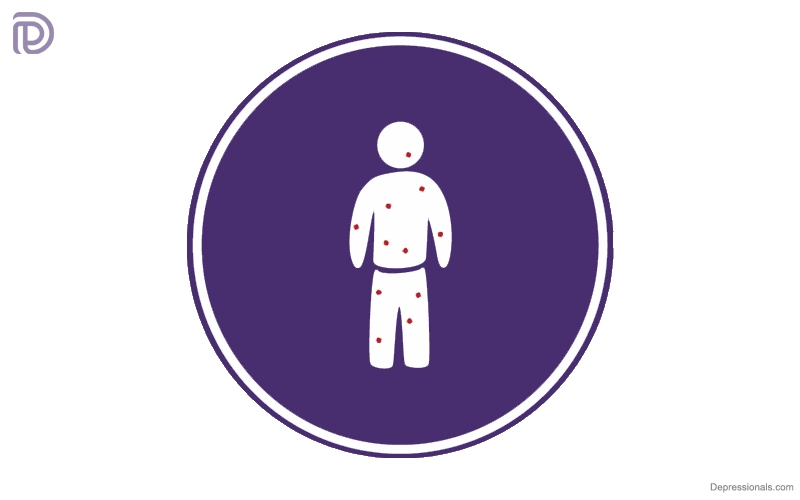Delusional parasitosis (DP) is a mental disorder that affects a small number of people. A person suffering from this disease is afraid that they are affected by a parasite. This isn’t the case; they don’t have any type of parasite infection.
This condition is also known as Ekbom syndrome or parasitosis delusions. A parasite is a creature that survives by relying on its host. fleas, Mites, worms, lice and spiders are examples of parasitic organisms.
This disease makes it impossible for a person to control or stop their ideas or beliefs. They aren’t simply believing they are infected with a parasite.
Read: What is Consciousness
Types delusional parasitosis
Delusional parasitosis is classified into three types:
- Primary delusional parasitosis: When a person has only one delusory belief. It’s asymptomatic sickness, meaning it only has one symptom.
- Secondary delusional parasitosis: This occurs when a person additionally has another mental health illness, such as dementia, depression, bipolar disorder, post-traumatic stress disorder (PTSD), obsessive-compulsive disorder (OCD) or schizophrenia.
- Organic delusional parasitosis: This can occur in people who have other medical problems or illnesses, such as hypothyroidism, diabetes, heart disease, vitamin B-12 insufficiency, cocaine addiction or menopause.
Delusional parasitosis symptoms
Parasitosis delusions patients frequently seek treatment from a doctor or dermatologist (skin doctor), claiming to have a parasitic illness within their body or on their skin.
The belief that they have a parasite inside them may be the only symptom of delusional parasitosis in some persons. They may also believe that the parasite has infested their home, furniture or surroundings.
A crawling sensation on the skin is another typical symptom reported by patients with delusional parasitosis. Formication is the medical name for this condition.
Some persons with this condition may also have the following symptoms:
- Itching or burning sensations
- Feeling of numbness
- Complaining of a creeping or prickling sensation under their skin
- Scraping the surface of the skin
- Skin picking
- Ulcers or skin lesions caused by scratching
- Scrubbing the skin with chemicals
- In severe situations, self-mutilation
- Self-medicate with potentially hazardous home remedies, such as pesticides
Read: Pervasive Developmental Disorder
Delusional parasitosis causes
It’s unclear why some people suffer from parasitosis delusions. Women in their forties and fifties are more likely to suffer from this mental illness. However, it is available to men and women of all ages.
Delusional parasitosis can occur as a result of a chemical imbalance in the brain caused by various medical conditions. It’s also possible that it’s connected to drug usage or addiction, such as cocaine addiction.
The exact location of this disease in the brain is unknown. According to some experts, psychosis (seeing, believing or hearing something that’s not there) is thought to be caused by the brain neurotransmitter dopamine. Too much dopamine in the brain can be caused by severe stress or other illnesses.
Diagnoses
If you suspect you have this disease, your doctor will do a thorough physical examination. They may also perform blood tests to rule out other possible reasons for skin itching, numbness, crawling and other symptoms that are comparable to delusional parasitosis.
These are some of the other possibilities:
- Anemia
- Thyroid disease
- Kidney disease
- Lymphoma
- Scabies infection
- Louse infection
- HIV infection
- Dermatitis herpetiformis
- Nerve disorders
- Parkinson’s disease
- Fibromyalgia
- Medications (amphetamines, methylphenidate)
- Morgellons disease
- Alcohol misuse
- Substance abuse
Read: Cognitive Disorder
Delusional parasitosis treatment
Any underlying problems must be treated as part of the treatment for delusional parasitosis. If a triggering disease exists, treating it might help to alleviate or end the parasitosis delusions.
Antipsychotic medicines may be prescribed by a doctor or psychiatrist. Delusional parasitosis patients may refuse to take these drugs because they feel they are suffering from a parasitic infection rather than a mental illness.
Therapy and consultations with a trustworthy doctor or psychiatrist may be beneficial. Because many family physicians and dermatologists are unfamiliar with medicines and therapies for this condition, it’s important to consult a psychiatrist.
For parasitosis delusions, a psychiatrist may prescribe antipsychotic medications such as:
- Pimozide (Orap)
- Aripiprazole (Abilify)
- Risperidone (Risperdal)\solanzapine (Zyprexa)
It’s not always possible to talk someone out of parasitosis delusions. A doctor can recommend you to a psychiatrist in these situations.
Read: Ganser Syndrome
Outlook
Delusional parasitosis, like other mental health problems, can take longer to treat and may necessitate multiple appointments with doctors and psychiatrists. It’s possible that one type of treatment will not work for everyone with this disease.
However, a qualified psychiatrist can provide one or more types of treatment and counseling to help alleviate or eliminate symptoms.
Read: Retrograde Amnesia
Summary
Delusional parasitosis is a very uncommon mental condition. This illness may be daunting for the individual as well as their family and friends.
However, it’s essential to remember that some treatments and individuals can assist, including reputable specialists and psychiatrists. A solid support system can also assist in the reduction of stress and suffering.
Delusional parasitosis might be caused by a chronic illness or another mental health problem. A doctor may do a thorough examination as well as various blood tests and scans to diagnose the illness. It may take some time to find the proper treatment strategy for this illness.






Everything is very open and very clear explanation of issues. was truly information. Your website is very useful. Thanks for sharing.